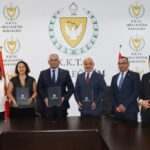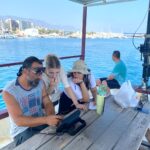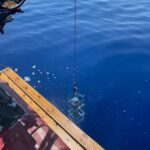
A TÜBİTAK-supported project, conducted jointly by Near East University and the University of Kyrenia, is exploring the biotechnological potential of Mediterranean seagrass meadows.
Scientific research in the TRNC is taking on a new dimension with the “Science and Technology Cooperation Protocol” between the Ministry of National Education and TÜBİTAK. The most recent example of this collaboration is a comprehensive marine biotechnology project led by Near East University faculty member Assoc. Prof. Dr. Selin Deliceırmak, in which the University of Kyrenia is also a partner.
The project, led by Assoc. Prof. Dr. Selin Deliceırmak, is titled “Exploration of Undiscovered Genes with Biotechnological Potential and Changes in Gene Expression in the Posidonia oceanica Host and Microbiota System in the Euphotic Marine Areas of the TRNC Using Amplicon Sequencing and Dual RNA-Sequencing Approaches.” Researchers in the project include Assistant Professors Dr. Doruk Kaynarca and Dr. Merdiye Maviş, Assist. Prof. Dr. Ulaş Hürdoğanoğlu and Dr. Nezihal Gökbulut from Near East University, and Capt. Çağrı Deliceırmak from the University of Kyrenia.
The TÜBİTAK-supported project is also one of the first comprehensive initiatives to record the biodiversity of island seas with scientific data. The signing ceremony for the project, which received TÜBİTAK support, was held in the Ministry of National Education meeting hall and was attended by Minister of National Education Nazım Çavuşoğlu, Near East University Rector Prof. Dr. Tamer Şanlıdağ, project leader Assoc. Prof. Dr. Selin Deliceırmak, and Behçet Çelebi, Director of the Department of Higher Education and Foreign Relations.
Posidonia oceanica seagrasses, known as “fidja,” are under threat!
The project focuses on seagrasses native to the Mediterranean and known locally as “fidja.” These underwater plants form important habitats in coastal waters and play a critical role in the ecosystem. However, fidja beds have decreased by 34 percent in the last 50 years, and the species is threatened by excess nutrient contamination, rising seawater temperatures, diseases, marine animal consumption, and invasive species. The project will use molecular methods to examine the diversity of plants and associated microorganisms, as well as their genetic variations, in fidja beds off the coast of Kyrenia. The research will also simultaneously identify genes important for biotechnology and drug development in seagrasses and host organisms. This approach allows to evaluate fidja not simply as a single species but as an ecosystem system in constant interaction with its environment.
The project will also pave the way for drug development!
In his assessment, Near East University Rector Prof. Dr. Tamer Şanlıdağ emphasized the project’s significance not only from a scientific perspective but also in terms of environmental sustainability and public benefit. Prof. Dr. Şanlıdağ said, “We believe that the collaboration between TÜBİTAK and the Ministry of National Education will increase the international visibility of the work of our academics in the TRNC. This research will pioneer future studies in the field of blue biotechnology and lay the groundwork for future drug development.”
Project manager Assoc. Prof. Dr. Selin Deliceırmak highlighted the project’s scientific contribution, saying, “Posidonia oceanica seagrasses, native to the Mediterranean, may hold the key not only to the marine ecosystem but also to significant biotechnological discoveries, including the blue carbon potential and new drug discoveries crucial for combating climate change.” Assoc. Prof. Dr. Selin Deliceırmak, also said, “With this project, we will assess the health of these valuable species and their role in the ecosystem, while also obtaining genetic data that will shed light on potential drug development processes. In this way, we aim to pave the way for new information that will benefit both the environment and humanity.”


